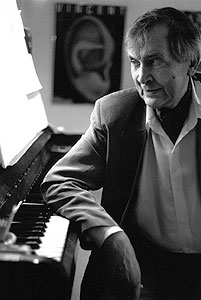Opera on DVD: Rasputin
| Available at Amazon: Rautavaara, Rasputin, Matti Salminen, Jorma Hynninen, Finnish National Opera (released on August 9, 2005) |
Grigori Yefimovich Rasputin (né Novyh) is a natural fit for opera, a mysterious and charismatic figure who loved passionately, survived assassination attempts by poison and stabbing, and then was shot and thrown into a river. True, Deborah Drattell's opera on the same story -- Nicholas and Alexandra, premiered at Los Angeles Opera in 2003, with Plácido Domingo as the Mad Monk -- was not a success, and Jay Reise's Rasputin fared no better at its New York City Opera premiere in 1988. (Nicolas Nabokov also attempted an opera on the story, Der Tod des Grigori Rasputin, in 1959.) Rautavaara, however, got it right, working from his own libretto. Most of the opera's appeal lies in his simultaneously seductive and repulsive characterization of Rasputin.
Bass Matti Salminen brings his vast, resonant voice and hulking presence to the title role. His first big aria ("There the crane flies over the tundra"), as he sings to the Tsarevich, the Romanovs' child who suffers from haemophilia, to calm him, is gorgeous. The words tell about taking a trip to Siberia, the cranes over the tundra, white swans, wild geese, what the echo replies to the bird calls, while the music repeats again and again cyclically and ends suddenly. (You bass-baritones out there should be learning this piece for recitals.) The music lulls the listener into believing Rasputin's line of crap through the magnificent choral scene at the end of first scene. An orgy of sound, it grows louder and louder, with apocalyptic percussion, dancers, and chorus costumed as bleeding, thorn-crowned Christs. I was mesmerized by it, until Mrs. Ionarts informed me that the sound was booming throughout the house and might wake up the children.
Rautavaara loses me, slightly, only in the tangle of subplots and minor characters. The opera has 27 (!) singing roles, and many of them essentially blend in with the chorus. The decadent nobles who eventually succeed in killing Rasputin are led by Grand Duke Dmitry Pavlovich (baritone Gabriel Suovanen) and Prince Felix Yusupov (tenor Jyrki Anttila). Tsarina Alexandra repeats rumors that the two men are in a homosexual relationship, that Felix is a cross-dresser: she refuses to let her daughter, Olga, be married to Dmitry. Several bishops or patriarchs foment discord among the crowds by spreading rumors of the Tsarevich's illness: they are in cahoots with a strange character, Mitya of Kozelski (character tenor Lassi Virtanen), who stutters and rides around, crippled, on some sort of skateboard, punctuating his lines with the crack of a whip. The best singing after Salminen's Rasputin comes from mezzo-soprano Lilli Paasikivi, as the pathetically credulous German-born Tsarina Alexandra.
 Just as in the DVD of Kaija Saariaho's L'Amour de Loin, the Finnish National Opera demonstrates how much new operas benefit from lavish productions. That is, that new operas might have more of a chance of pleasing audiences if they are cast with major singers and attractively staged. In this gorgeous production directed by Vilppu Kiljunen, the viewer is immediately submerged in the emotional distress of the imperial parents as their young son suffers another attack of hemophilia. During the opera's dissonant introduction, Tsarina Alexandra, highlighted by a follow spot, rushes around the vertiginous, swirling sets designed by Hannu Lindholm.
Just as in the DVD of Kaija Saariaho's L'Amour de Loin, the Finnish National Opera demonstrates how much new operas benefit from lavish productions. That is, that new operas might have more of a chance of pleasing audiences if they are cast with major singers and attractively staged. In this gorgeous production directed by Vilppu Kiljunen, the viewer is immediately submerged in the emotional distress of the imperial parents as their young son suffers another attack of hemophilia. During the opera's dissonant introduction, Tsarina Alexandra, highlighted by a follow spot, rushes around the vertiginous, swirling sets designed by Hannu Lindholm.The score blends music in many styles, with disorienting and acidic dissonance to create dramatic tension, but Rautavaara is not afraid of lush, more tonal harmonies. There are moments of extraordinary beauty, like the Easter scene in Act II, with a choral setting of the Regina caeli (in Finnish) and Rasputin's triumphant proclamation of the Resurrection ("Khristos voskrese!") answered by the crowd. Most critics usually label Rautavaara as a mystic composer, in line with composers like Pärt, Tavener, Gorecki, using more or less tonal harmonies, ethereal or austere orchestration, and chant-like melodies. That description holds true for much of the score of Rasputin.
Rautavaara has created some fine ensemble pieces for the Tsar's four daughters, sung here by Sari Aittokoski (Olga), Tuija Knihtilâ (Tatyana), Helena Juntunen (Maria), and Anna-Kristiina Kaappola (Anastasia). Rautavaara uses his orchestra (here the FNO orchestra, conducted well by Mikko Franck, to whom the score is dedicated) in a mostly traditional way, with some effects thrown in, like Lady Macbeth-like erotic trombone slides, what sounds like a slide whistle (a theremin?), and a salon air played by an onstage piano ("A troika speeds through the woods"). Definitely worth your time.
Ondine ODV 4003
A very interesting upcoming DVD release from Ondine is Karita Mattila's recital on the stage of the Finnish National Opera, a program that includes Kaija Saariaho's song cycle Quatre instants, due out next spring.





















































No comments:
Post a Comment